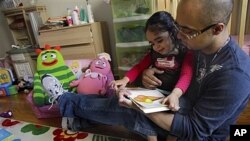Scientists say a hormone called oxytocin appears to improve brain functioning in children with autism, a neurodevelopmental disorder that can be marked by limited social interaction, repetitive behaviors and, occasionally, violent outbursts.
The study investigating the effect of oxytocin in autistic children stemmed from observations of the tiny prairie vole, a mouse-sized rodent that lives in the grasslands of the United States and Canada. Oxytocin promotes bonding between mothers and their offspring, experts say. Higher levels of the hormone were found in voles that lived in pairs, while solitary voles had lower levels.
Researchers at Yale University in Connecticut wondered about the role of oxytocin in autistic children, who are often solitary and have trouble bonding with others. In the first study looking at the impact of the hormone on brain function, researchers studied 17 medium- to high-functioning autistic youngsters between the ages of eight and 16 and a half.
The scientists administered a single dose of oxytocin via nasal spray to half of the children. The other half were given a placebo. Investigators then did computerized imaging of their brains. In the treated children, areas of the brain that had previously been silent in association with reward and emotion lit up. In other words, they responded to social stimuli, such as another person's face.
Kevin Pelphrey, head of the Center for Translational Developmental Neuroscience at Yale, led the study. He hopes longer treatment with oxytocin leads to changes in behavior.
“We would expect the kids to be more socially engaged, make more eye contact, understand sort of subtle social advances more clearly and be more interested in interacting with other people," said Pelphrey.
But practical use of these results may be some time away. Gina Ballone is with the organization Achieve Beyond, which offers clinical services and interpersonal therapies to autistic children and their parents.
“And I think that, not to blame the parents, the parents want a quick fix. And unfortunately there’s no quick fix with autism," said Ballone.
Pelphrey and his colleagues are planning larger studies to learn whether oxytocin given for a longer time helps autistic children.
An article on the potential benefits of the hormone oxytocin in autistic children is published in the journal Proceedings of the National Academy of Sciences.
The study investigating the effect of oxytocin in autistic children stemmed from observations of the tiny prairie vole, a mouse-sized rodent that lives in the grasslands of the United States and Canada. Oxytocin promotes bonding between mothers and their offspring, experts say. Higher levels of the hormone were found in voles that lived in pairs, while solitary voles had lower levels.
Researchers at Yale University in Connecticut wondered about the role of oxytocin in autistic children, who are often solitary and have trouble bonding with others. In the first study looking at the impact of the hormone on brain function, researchers studied 17 medium- to high-functioning autistic youngsters between the ages of eight and 16 and a half.
The scientists administered a single dose of oxytocin via nasal spray to half of the children. The other half were given a placebo. Investigators then did computerized imaging of their brains. In the treated children, areas of the brain that had previously been silent in association with reward and emotion lit up. In other words, they responded to social stimuli, such as another person's face.
Kevin Pelphrey, head of the Center for Translational Developmental Neuroscience at Yale, led the study. He hopes longer treatment with oxytocin leads to changes in behavior.
“We would expect the kids to be more socially engaged, make more eye contact, understand sort of subtle social advances more clearly and be more interested in interacting with other people," said Pelphrey.
But practical use of these results may be some time away. Gina Ballone is with the organization Achieve Beyond, which offers clinical services and interpersonal therapies to autistic children and their parents.
“And I think that, not to blame the parents, the parents want a quick fix. And unfortunately there’s no quick fix with autism," said Ballone.
Pelphrey and his colleagues are planning larger studies to learn whether oxytocin given for a longer time helps autistic children.
An article on the potential benefits of the hormone oxytocin in autistic children is published in the journal Proceedings of the National Academy of Sciences.




